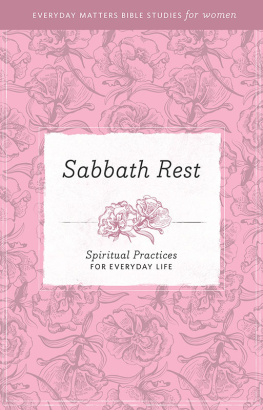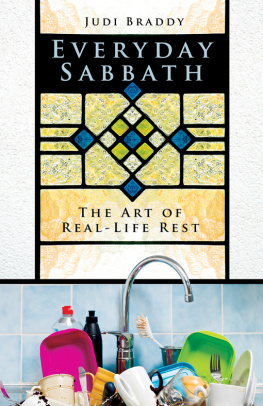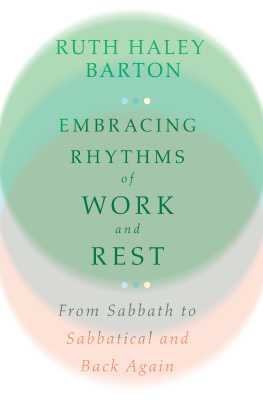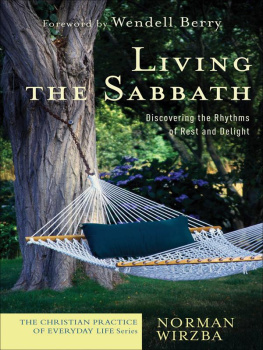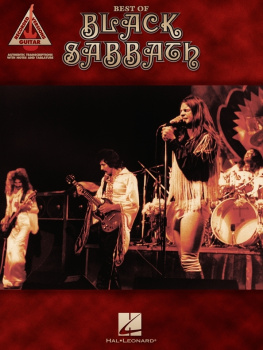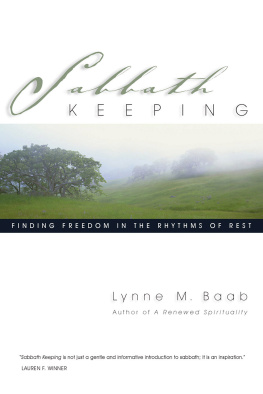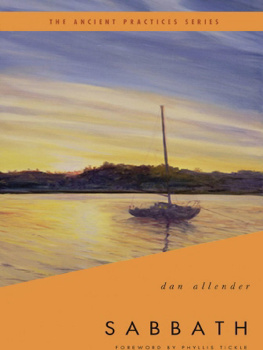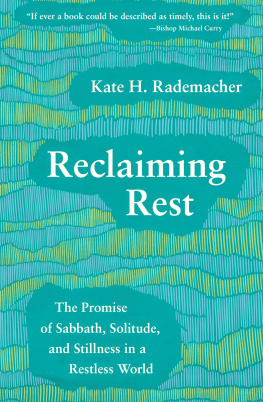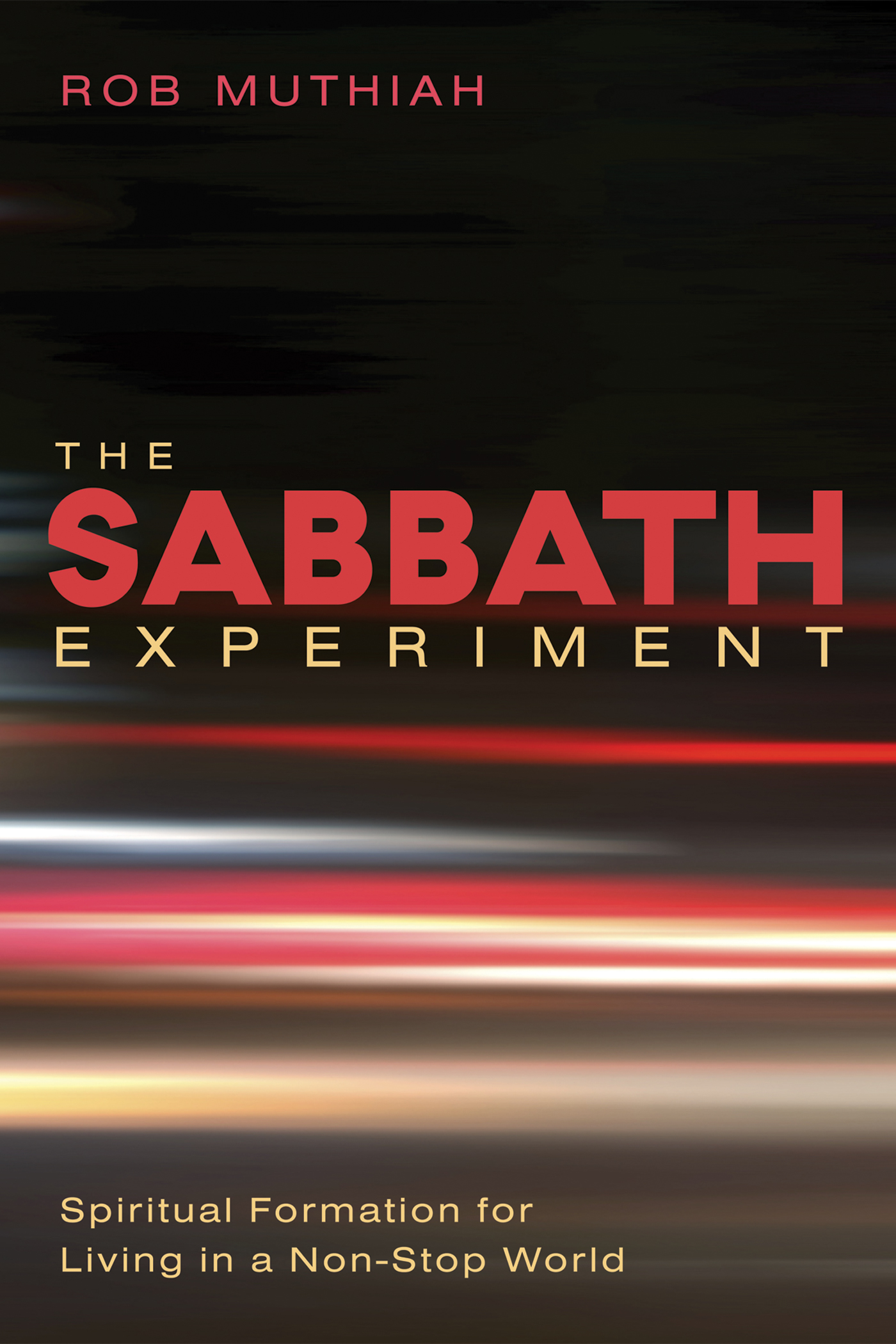The Sabbath Experiment
Spiritual Formation for Living in a Non-Stop World
Rob Muthiah

THE SABBATH EXPERIMENT
Spiritual Formation for Living in a Non-Stop World
Copyright 2015 Robert A. Muthiah. All rights reserved. Except for brief quotations in critical publications or reviews, no part of this book may be reproduced in any manner without prior written permission from the publisher. Write: Permissions, Wipf and Stock Publishers, 199 W. 8th Ave., Suite 3, Eugene, OR 97401.
Cascade Books
An Imprint of Wipf and Stock Publishers
199 W. 8th Ave., Suite 3
Eugene, OR 97401
www.wipfandstock.com
ISBN 13: 978-1-4982-2419-2
EISBN 13: 978-1-4982-2420-8
Cataloging-in-Publication data:
Muthiah, Robert A.
The Sabbath experiment : spiritual formation for living in a non-stop world / Rob Muthiah.
xii + 106 p. ; 23 cm. Includes bibliographical references.
ISBN 13: 978-1-4982-2419-2
1. Sabbath. 2. Spiritual formation. 3. Spiritual lifeChristianity. I. Title.
BV4501.3 M87 2015
Manufactured in the U.S.A.
Scripture taken from the Common English Bible, CEB Copyright 2010, 2011 by Common English Bible. Used by permission. All rights reserved worldwide. The CEB and Common English Bible trademarks are registered in the United States Patent and Trademark Office by Common English Bible. Use of either trademark requires the permission of Common English Bible.
New Revised Standard Version Bible, copyright 1989, Division of Christian Education of the National Council of the Churches of Christ in the United States of America. Used by permission. All rights reserved.
To Lionel and Marion Muthiah
Preface
During my years of involvement in seminary education, first as a student and later as a professor, I have seen a shift in relation to spiritual formation. For a while, it seemed that every book and article about seminary education critiqued seminaries for teaching esoteric theology while ignoring their students spiritual formation. Seminaries took note, and in recent years more and more seminaries have been intentional about structuring spiritual formation into their programs.
In my own teaching as a seminary faculty member, one of the approaches to spiritual formation that I have found most powerful for students is that of Sabbath keeping. The practice is so rich theologically that it constantly opens new horizons of understanding for these theologically curious and questioning minds. The practice is intriguing because it is ancient and yet new to many of my students. And heres the important part: my students find that the practice of keeping the Sabbath actually does somethingit forms them spiritually in profound ways.
My hope in writing this book is that this approach to spiritual formation might ripple out to other parts of the churchand there are manythat have lost the ancient skill of practicing Sabbath. I have three audiences in mind as I write. First, I have in mind those of you who consider yourselves ordinary, faithful members of local churches. Perhaps you are a landscaper, a teacher, a business executive, or a stay-at-home parent. I want you to know and experience that Sabbath is possible and life-giving, even (or, especially) in todays culture. I try to take seriously your realities of juggling work, parenting, church involvement, recreation, and all the other things in your lives as I invite you to Sabbath.
Second, I have in mind those of you who are pastors. You are notorious for not taking care of yourselves! I wonder if you might re-claim Sabbath as a way of tending to your own spiritsfor Gods sake, for the sake of yourselves, and for the sake of those you serve in your churches. Additionally, my hope is that you will draw on ideas included in this book as you thoughtfully attend to the spiritual formation of your flock. Pastors face a unique challenge in relation to Sabbath: what does Sabbath look like for pastors when Sunday morning preaching and leadership responsibilities are part of their job descriptions? Ive included some creative approaches that some pastors have used related to this issue (see chapter 2, Sabbath, Rest, and Work).
Third, I have in mind those of you who are seminary and college students interested in the life of the church, a group of folks dear to my heart. If you are a student reading this, it has probably been assigned for a class (I am well aware that students seldom have time to read anything else!). My hope is that the theology and practice of Sabbath will contribute to your spiritual formation during this season of focused study in your lives and that what you learn and practice now will sustain you long after your degree programs are completed.
I will weave together three approaches in this book. One approach is to look at the theology of Sabbath that emerges from Scripture. No, Im not going to try to get us to follow all the detailed Sabbath practices described in the Old Testament (I certainly wont be promoting the instruction to stone those who dont keep Sabbath, found in Numbers 15:35!). However, by probing the teachings on Sabbath contained in both the Old and New Testaments, well gain insight into the theological dimensions that are still present in our Sabbath keeping today.
A second approach I will use is to look at how Sabbath relates to some of the forces at work in the dominant culture today, forces such as individualism, consumerism, and technology. This could easily devolve into a simplistic Christianity vs. the dominant culture rantgood vs. evil. But for us as Christians, to wrestle with how we should relate to our host culture in a given time and place is more complex than that. Sabbath forms us into a contrast community, but Sabbath also sends us back into the dominant culture to engage, to love, and to join in Gods transforming work in this world. Well look at ways in which that might happen.
Third, I will tell stories of how various people are living out this practice today, give concrete suggestions for Sabbath observance, and point to some of the challenges of observing the Sabbath in our fast-paced, post-Christian culture. The goal here is to move from ideas about Sabbath to actually living out Sabbath practices in the rhythm of our weeks.
Whether you read this book on your own or as part of a group, keep in mind that Sabbath always has a communal element. I point to this numerous times throughout this book. You will get the most out of this book if you approach it communally; find others with whom to discuss the questions provided at the end of each chapter.
I number the Sabbath commandment as the fourth commandment in this book, but I am aware that some traditions place it at number three. See the call-out box on page 26 for a comparison of these numbering systems.
Throughout this book, when I refer to the Sabbath Experiment, Im referring to a twenty-four hour experience that I give to my students as a class assignment. You will be invited to try the experiment, too. Call-out boxes throughout this book with the title Reflecting on the Sabbath Experiment contain quotations (used with permission) from students papers in which they reflect on their Sabbath Experiment. The guidelines for the Sabbath Experiment are included in Appendix 2, and at the end of chapter six you will be invited to carry out the experiment yourself.
Between each chapter you will find short Slowing Down sections. Each Slowing Down section provides a chance to slow down for a moment from the main narrative of the book and to go deeper with a portion of Scripture related to Sabbath. If you are using this book with a discussion group, each of these sections could be given its own week for discussion or combined with the chapter that comes before it.


